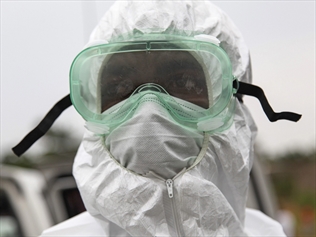
WHO to meet to thrash out the ethical dilemma of who gets access to experimental Ebola drugs. Source: AAP
NOW it’s not just two Americans, but a Spaniard as well: the three non-Africans known to have Ebola have got some of the very few doses that exist of an experimental drug aimed at treating the deadly disease.
NONE of the more than 1700 Africans sick with Ebola have received this treatment.
This drug, ZMapp, is so novel and unproven that not much is available and its effectiveness remains unknown. It could end up doing more harm than good. It would take months to produce even modest quantities. Even then, using it more widely would present other ethical dilemmas. But many Africans are seeing a larger, bitter truth in the fact that two Americans and a Spaniard were able to get this treatment after being infected in West Africa, where the haemorrhagic fever has raged for months, killing 961 people and counting. “There’s no reason to try this medicine on sick white people and to ignore blacks,” said Marcel Guilavogui, a pharmacist in Conakry, Guinea. “We understand that it’s a drug that’s being tested for the first time and that could have negative side effects. But we have to try it in blacks too.” Some are using Twitter to demand that the drug be made available in Africa. “We can’t afford to be passive while many more die,” said Aisha Dabo, a Senegalese-Gambian journalist who was tweeting using the hashtag “GiveUsTheSerum” on Monday. “That’s why we raise our voice for the world to hear us.” The ethical dilemmas involved prompted the UN health agency to consult on Monday with ethicists, infectious disease experts, patient representatives and the Doctors Without Borders group. Most participants in the closed teleconference were from developed countries, but Uganda and Senegal had people in the meeting. The World Health Organisation said it would describe the results of the discussion at a news conference on Tuesday, but didn’t announce whether it would make recommendations for deciding which Ebola patients should get experimental therapies. “It certainly looks bad that only three Westerners have gotten the drug while most of the people with Ebola are African,” said Art Caplan, director of bioethics at NYU Langone Medical Centre, who was not involved in Monday’s consults. The drugmaker should clarify its policy, said Caplan. “I don’t think this scarce resource should just be given to whoever is best connected.” The drug is made by Mapp Biopharmaceutical Inc., a small, San Diego-based company that did not respond to calls or emails from The Associated Press on Monday. Companies can provide experimental drugs on a “compassionate use” basis, usually after they have been fully tested in humans. The Food and Drug Administration approves such uses in the US, but has no authority overseas. Ultimately, the companies alone decide whether or not to share their products, and it wasn’t clear on Monday whether the governments of these West African countries have asked them directly. Spain’s Health Ministry said it obtained ZMapp this weekend with company permission to treat Miguel Pajares, a 75-year-old priest evacuated from Liberia and placed in isolation Thursday at Madrid’s Carlos III Hospital. “The medicine was imported from Geneva where there was one dose available in the context of an accord between the laboratory that developed the medicine, WHO and (Doctors Without Borders),” the ministry said, invoking a Spanish law permitting unauthorised medication for patients with life-threatening illnesses. Nigeria’s health minister, Onyenbuchi Chukwu, said last week that when he asked the US Centres for Disease Control and Prevention about getting the drug, he was told the manufacturer would have to agree and that the CDC won’t get involved.
